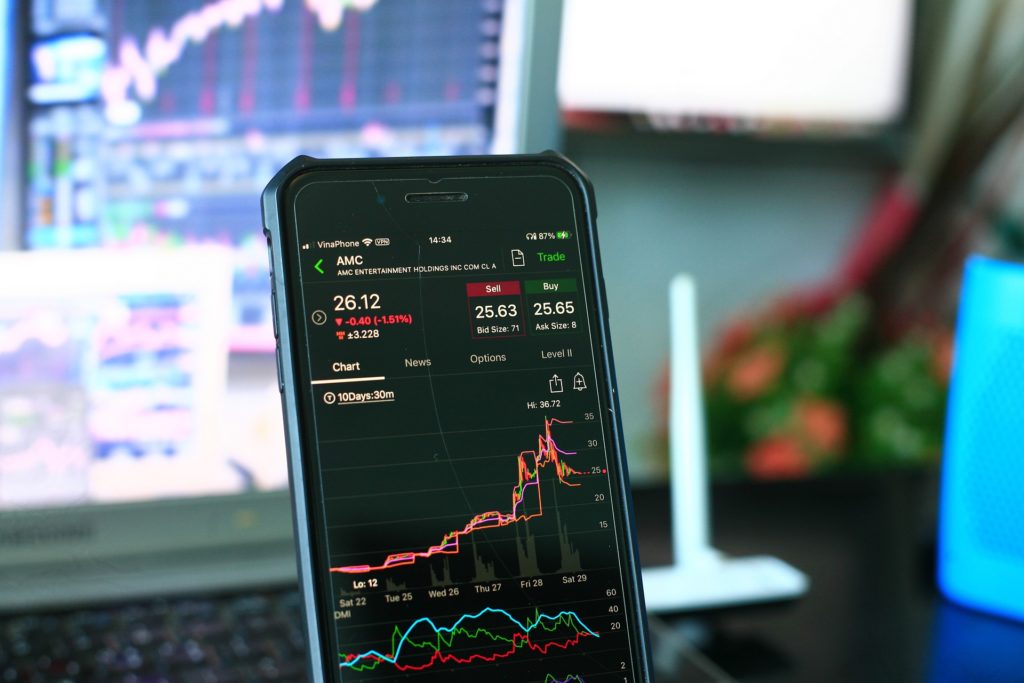Robinhood is an online investment platform that allows users to trade stocks, ETFs, options, and cryptocurrencies without paying commissions. In this review, we’ll take a look at how to use Robinhood in 2023 and what you can expect from the platform.
Getting started with Robinhood is easy. You can download the app from the App Store or Google Play and create an account in a few simple steps. Once your account is set up, you can link your bank account and start trading.
One of the key features of Robinhood is its commission-free trading. This means you can buy and sell stocks, ETFs, options, and cryptocurrencies without paying any fees. This can be a significant cost savings compared to other online brokers.
Another advantage of Robinhood is its user-friendly interface. The app is designed to be intuitive and easy to use, even for beginners. You can search for stocks and other securities, view price charts, and place trades with just a few taps.
However, it’s important to note that Robinhood has faced some controversy in the past. In 2021, the platform came under scrutiny for its role in the GameStop short squeeze, and some users have reported issues with customer service and account security.
If you’re considering using Robinhood in 2023, here are some tips to keep in mind:
- Do your research: Before making any trades, do your due diligence and research the companies or securities you’re interested in. Robinhood provides a variety of research tools and market data to help you make informed decisions.
- Set realistic expectations: Remember that investing carries risk, and there are no guarantees of profit. Set realistic expectations for your returns and don’t invest more than you can afford to lose.
- Diversify your portfolio: To reduce your risk, consider diversifying your portfolio across different asset classes and industries.
- Keep an eye on fees: While Robinhood offers commission-free trading, there are still other fees to be aware of, such as margin interest and options trading fees.
- Stay informed: Keep up-to-date on market news and trends that may impact your investments, and be prepared to adjust your portfolio as needed.
Overall, Robinhood can be a great option for those looking to start investing with low fees and a user-friendly platform. Just be sure to do your research and keep a long-term perspective on your investments.
What Type Of Investor Should Use Robinhood?
Robinhood is an investment platform that is ideal for investors who are looking for a user-friendly and cost-effective way to buy and sell stocks, ETFs, options, and cryptocurrencies. Here are some types of investors who may benefit from using Robinhood:
- Beginner investors: Robinhood’s easy-to-use interface and commission-free trading make it a great option for investors who are just starting out.
- Passive investors: If you’re looking to build a long-term, diversified portfolio and want to avoid high fees, Robinhood’s low-cost ETFs and commission-free trades can be a good fit.
- Active traders: For those who want to trade frequently, Robinhood’s low fees can help keep costs down and maximize returns.
- Cryptocurrency investors: Robinhood allows you to trade cryptocurrencies commission-free, making it a great option for those interested in investing in this emerging asset class.
However, it’s important to note that Robinhood may not be the best fit for all investors. Here are some factors to consider before using the platform:
- Limited investment options: While Robinhood offers a variety of investment options, it may not have as many choices as other online brokers.
- Limited research tools: Robinhood’s research tools may be limited compared to other brokers, which could make it more challenging to conduct thorough analysis and research.
- Riskier investments: Robinhood’s commission-free trading may make it easier for investors to take on riskier investments, which may not be appropriate for everyone.
- Customer service: Some users have reported issues with Robinhood’s customer service, so if you value responsive support, this may be a concern.
Robinhood can be a great option for investors who are looking for low fees, a user-friendly platform, and a variety of investment options. However, it’s important to consider your investment goals and risk tolerance before using the platform.
How Robinhood Compares To Other Popular Investing Platforms
Robinhood is just one of many popular investing platforms available today. Here’s how it compares to some of its competitors:
- E-Trade: E-Trade offers a wide range of investment products, including stocks, ETFs, options, and mutual funds. While E-Trade charges commissions for some trades, it offers a more extensive selection of research tools and investment resources than Robinhood.
- TD Ameritrade: TD Ameritrade offers a variety of investment products, including stocks, ETFs, options, futures, and mutual funds. Like E-Trade, TD Ameritrade charges commissions for some trades, but offers more advanced research tools and resources than Robinhood.
- Fidelity: Fidelity offers a wide range of investment products, including stocks, ETFs, options, mutual funds, and fixed income securities. Fidelity offers low fees for most of its trades, and has more advanced research tools and educational resources than Robinhood.
- Vanguard: Vanguard is known for its low fees and passive investment approach, with a focus on low-cost index funds and ETFs. While Vanguard offers a more limited selection of investment products than Robinhood, it offers some of the lowest fees in the industry.
- Charles Schwab: Charles Schwab offers a variety of investment products, including stocks, ETFs, options, and mutual funds. Like Robinhood, Charles Schwab offers commission-free trading for some trades, but also offers more advanced research tools and educational resources.
Overall, each platform has its own strengths and weaknesses, and the best one for you will depend on your investment goals, risk tolerance, and investment style. Robinhood may be a good fit for those who prioritize low fees and a user-friendly interface, but those who require more advanced research and investment resources may prefer other platforms. It’s always a good idea to research your options and compare features before choosing a platform.
With Robinhood, you can buy, sell, and trade the following types of investments:
- Stocks: Robinhood offers commission-free trading for stocks listed on U.S. exchanges, including NYSE and NASDAQ.
- ETFs: Robinhood offers commission-free trading for a wide range of ETFs (Exchange-Traded Funds), which are baskets of securities that track an underlying index, commodity, or other asset class.
- Options: Robinhood offers commission-free trading for options contracts, which give the holder the right to buy or sell an underlying asset at a predetermined price.
- Cryptocurrencies: Robinhood offers commission-free trading for cryptocurrencies, including Bitcoin, Ethereum, and Dogecoin.
It’s important to note that while Robinhood offers commission-free trading for these investments, you may still be subject to other fees and charges, such as regulatory fees or fees for trading outside of regular market hours. Additionally, Robinhood may not offer as many investment options or advanced research tools as other online brokers, so it’s important to consider your investment goals and needs before using the platform.
Robinhood’s cash management services allow account holders to:
- Earn interest on uninvested cash: Robinhood offers a Cash Management account that pays interest on uninvested cash at a variable interest rate. The interest rate is subject to change based on market conditions.
- Spend using a debit card: Account holders can use the Robinhood debit card to spend their cash balance at any merchant that accepts Mastercard. The card has no annual or foreign transaction fees.
- Get cash at ATMs: Account holders can use the Robinhood debit card to withdraw cash at over 75,000 ATMs worldwide.
- Direct deposit: Account holders can set up direct deposit to their Robinhood account, which allows their paycheck to be deposited directly into their account.
It’s important to note that Robinhood’s cash management services are not FDIC-insured, and there is always a risk that you could lose money if you invest in the stock market. Additionally, while Robinhood’s cash management services offer convenience and some benefits, they may not be the best option for everyone, especially those who prioritize safety and security of their cash.
What are the pros of using Robinhood?
Here are some potential pros of using Robinhood:
- Commission-free trading: One of the biggest advantages of Robinhood is its commission-free trading model, which can save investors money compared to traditional brokers that charge fees for every trade.
- User-friendly interface: Robinhood has a simple and intuitive interface that makes it easy for new investors to get started. The platform also offers educational resources and a community forum where investors can share ideas and strategies.
- Mobile app: Robinhood has a mobile app that allows investors to manage their accounts and make trades from their smartphone, which can be convenient for investors who are always on the go.
- Low minimums: Robinhood has no minimum account balance requirement, which makes it accessible to investors with limited funds.
- Fractional shares: Robinhood allows investors to buy fractional shares, which can be a useful tool for those who want to invest in expensive stocks but don’t have enough capital to buy a full share.
It’s important to note that while Robinhood has its advantages, it may not be the best option for every investor. The platform has limited investment options and research tools compared to some other brokers, and there have been concerns about its customer service and security in the past. Investors should carefully consider their individual needs and goals before deciding whether to use Robinhood or another investment platform.
What are the cons of using Robinhood
Here are some potential cons of using Robinhood:
- Limited investment options: While Robinhood offers commission-free trading for stocks, ETFs, options, and cryptocurrencies, it may not offer as many investment options as other brokers. For example, it doesn’t offer access to mutual funds, bonds, or futures trading.
- Limited research tools: Robinhood’s research tools are more limited than some other brokers, which could be a disadvantage for investors who rely heavily on analysis and research to make investment decisions.
- Customer service: Robinhood has faced criticism for its customer service, with some users reporting long wait times and difficulty reaching a representative.
- Security concerns: Robinhood has had some security issues in the past, including a 2021 data breach that exposed the personal information of millions of users. While the company has taken steps to improve security, it may still be a concern for some investors.
- No retirement accounts: Robinhood does not currently offer retirement accounts like IRAs or 401(k)s, which could be a disadvantage for investors who want to save for retirement.
It’s important to note that every investor’s needs and preferences are different, and what may be a disadvantage for one investor may not be for another. Investors should carefully consider their individual needs and goals before deciding whether to use Robinhood or another investment platform.
Here’s how you can set up an account with Robinhood:
- Go to Robinhood’s website or download the mobile app: Robinhood offers a web platform and mobile apps for iOS and Android devices. You can start the account creation process on either platform.
- Provide your personal information: To open an account with Robinhood, you’ll need to provide personal information such as your name, address, date of birth, and social security number.
- Answer a few questions about your investment experience: Robinhood will ask you a few questions to determine your investment experience and risk tolerance. This information will help the platform make investment recommendations for you.
- Link your bank account: You’ll need to link a bank account to your Robinhood account in order to transfer funds and make trades. Robinhood supports most US banks, and you can link multiple accounts if necessary.
- Fund your account: Once your bank account is linked, you can transfer funds to your Robinhood account. You can transfer funds via ACH transfer or wire transfer, and there are no fees for depositing or withdrawing funds.
- Start trading: Once your account is funded, you can start trading stocks, ETFs, options, and cryptocurrencies. Robinhood offers commission-free trading for these asset classes, and you can place trades from the web platform or mobile app.
It’s important to note that Robinhood may require additional documentation or verification steps depending on your individual situation. Make sure to read the terms and conditions carefully before opening an account and investing any money.
Here are the steps to get started investing with Robinhood:
- Open an account: To start investing with Robinhood, you need to open an account by providing personal information, answering some questions about your investment experience and risk tolerance, and linking your bank account.
- Fund your account: After opening an account, you need to transfer funds to your Robinhood account from your linked bank account. You can fund your account through ACH transfer or wire transfer.
- Choose the investments: Once you have funds in your account, you can start investing. Robinhood allows you to invest in stocks, ETFs, options, and cryptocurrencies. You can browse the available investments on the platform and conduct research to decide which ones to invest in.
- Place a trade: After selecting the investment you want to buy, you need to place a trade. Robinhood allows you to buy and sell investments through its mobile app or web platform. Simply enter the ticker symbol for the investment you want to buy or sell, and specify the number of shares or contracts you want to trade.
- Monitor your investments: After you have made your investment, you should keep an eye on it to ensure it is performing as expected. You can track your investments through the Robinhood app or platform and make adjustments as needed.
It’s important to note that investing carries risks, and you should carefully consider your investment goals and risk tolerance before making any investment decisions. Additionally, Robinhood provides limited research and analysis tools compared to other investment platforms, so you may want to conduct additional research elsewhere before making investment decisions.
Here are the steps to buy a stock on Robinhood:
- Log in to your Robinhood account: Open the Robinhood app or website and log in to your account.
- Search for the stock: Using the search bar at the top of the screen, enter the name or ticker symbol of the stock you want to buy. Robinhood provides information on stocks, including price, charts, and analyst ratings.
- Tap on the stock: Once you have found the stock you want to buy, tap on the name or ticker symbol to go to the stock detail page.
- Tap “Trade”: On the stock detail page, tap the “Trade” button.
- Choose “Buy”: On the trade screen, choose the “Buy” option.
- Enter the trade details: Enter the number of shares you want to buy, the type of order (market or limit), and the price you are willing to pay.
- Review and confirm: Review the trade details, including the estimated cost and any fees, and confirm the trade.
- Wait for the trade to execute: After you have confirmed the trade, Robinhood will execute the trade as soon as possible at the price you specified. You can monitor the status of your trade in your order history.
It’s important to note that investing carries risks, and you should carefully consider your investment goals and risk tolerance before making any investment decisions. Additionally, Robinhood provides limited research and analysis tools compared to other investment platforms, so you may want to conduct additional research elsewhere before making investment decisions.
Here are some ways you can invest responsibly and lower your risks with Robinhood:
- Educate yourself: Before investing in any stock, ETF, or cryptocurrency, make sure you understand the investment and the risks associated with it. Robinhood provides some basic information and analysis, but you should also conduct your own research and analysis before making any investment decisions.
- Diversify your portfolio: Don’t put all your money into one investment or one sector. Diversify your portfolio by investing in different types of stocks, ETFs, or cryptocurrencies across different sectors and industries.
- Invest for the long term: Investing in the stock market is a long-term game. Don’t try to time the market or make short-term gains. Instead, invest in quality companies or assets that you believe will grow over time.
- Set realistic expectations: Don’t expect to get rich quick or make a fortune overnight. Investing is a slow and steady process, and it takes time to see returns. Set realistic expectations and don’t invest more than you can afford to lose.
- Monitor your investments: Keep an eye on your investments and monitor their performance regularly. If a stock, ETF, or cryptocurrency is not performing as expected, consider selling it and investing in something else.
- Limit your exposure to risky investments: Robinhood offers access to a variety of investments, including options and cryptocurrencies. These types of investments can be riskier than traditional stocks and ETFs, so be sure to limit your exposure and only invest in them if you understand the risks and are comfortable with the potential losses.
By investing responsibly and following these guidelines, you can lower your risks and increase your chances of long-term success with Robinhood.
Review of using Robinhood
However, based on reviews from users, Robinhood is a popular investment app that offers commission-free trading of stocks, ETFs, and cryptocurrencies. The app is known for its user-friendly interface and ease of use, making it a popular choice for beginner investors. Some users have praised its simplicity and low fees, while others have raised concerns about its customer support and the potential risks of trading volatile investments.
Overall, Robinhood may be a good option for those who want to dip their toes into investing with a user-friendly platform and low barriers to entry.









